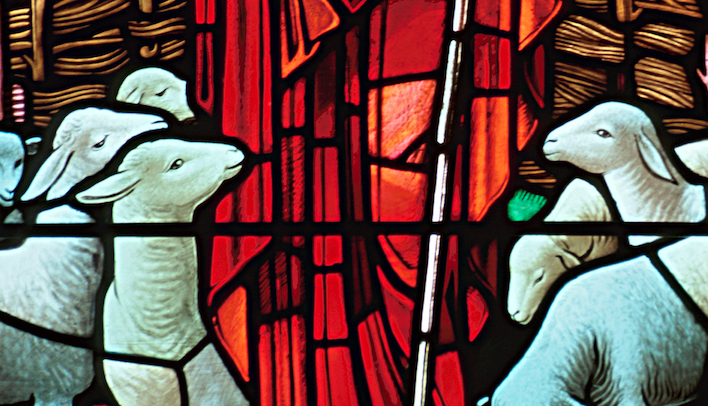By Dr. Mark Scott
 In the field of education, accreditation is an organized means of ensuring academic quality. One question might be: who determines that academic quality? Who has the authority to say whether or not some aspect of education is good? What happens if those with the credentials, the clout, the majority, and the machinery are all wrong?
In the field of education, accreditation is an organized means of ensuring academic quality. One question might be: who determines that academic quality? Who has the authority to say whether or not some aspect of education is good? What happens if those with the credentials, the clout, the majority, and the machinery are all wrong?
The prophet Amos (the third minor prophet in the biblical canon) encountered that same idea. Those with the credentials, clout, and influence were dead wrong. Amos was from Judah (south), but he prophesied in Israel (north) around 755 BC just about 33 years before the Assyrians captured the ten northern tribes and evidently two years before some famous earthquake (Amos 1:1).
Go Back
Amos 7:10-13
Darkness does not like light (John 3:19-21), which is why Amaziah did not like Amos. Amaziah was a “yes man” for wicked Jeroboam II, the king of Israel. Amaziah served as the priest of Bethel. It is a mockery because Bethel means “house of God.” But God’s house was in Jerusalem, and that is where the priests served. To have a priest serving in Bethel was the narrator’s way of saying that idolatry was reigning.
This phony priest sent a memo to the king about Amos’s ministry. Amaziah accused Amos of raising a conspiracy against the king. Amaziah’s perspective was that Amos was putting the nation in a noose by his prophesying. Amaziah said, The land cannot bear all his words.
To Amaziah’s credit he did get Amos’s quote correct: Jeroboam will die, and the northern tribes would go into Assyrian captivity. Amaziah was emboldened to say what he really felt: Get out . . . Go back. Amaziah joined a chorus of people in the Bible who did not want to hear from God (1 Kings 18:16-18; 2 Chronicles 18:12-27; Acts 4:13-21).
For Amaziah, prophesying was a job—not a calling, so he said, Earn your bread there and do your prophesying there. Amaziah had emotional ownership over Bethel and the idolatrous temple set up there, which compromised the genuine worship of God’s people in Jerusalem. But it would take more than a mere retort to stop Amos, the shepherd from the southern kingdom.
Go Prophesy
Amos 7:14-17
Amos’s authority to speak was not based on his pedigree. He gave a powerful self-disclosing speech. He confessed that he was neither a prophet nor the son of a prophet. Vocationally he was a shepherd and farmer (keeper of sycamore-fig trees, like the one Zacchaeus climbed in Luke 19:4). Amos knew who he was and who he was not, like John the Baptist (John 1:19-23).
God was the one who enlisted Amos as a prophet. Amos did not ask for the prophetic job. But do not think that his occupation made him inarticulate. His book is filled with powerful metaphors and figures of speech. Here was a shepherd and farmer who could turn a phrase.
In verse 16 of our text he quoted what Amaziah had said to him about not prophesying, but he put an interesting twist to it. He said, Stop preaching against the descendants of Isaac. This is the only time that expression occurs in the whole Bible. Since Isaac’s name means laughter (Genesis 18:9-15) perhaps this is an example of paronomasia (a play on words). Maybe the sense is, “It is laughable that you would stop me from preaching to the laughable covenant people.”
The final verse of our text pulls no punches. Amos had a word for Amaziah—it was a fivefold testimony. Amaziah’s wife would become a prostitute. Amaziah’s sons and daughters would fall by the sword (in war or murdered). The land would be measured and divided up (lost to others). Amaziah would die in exile, and the 10 northern tribes would be hauled off to exile. This would locate them outside of the land flowing with milk and honey.
How to interpret verse 17 is a bit challenging. The text might be figurative—not literal. In other words, maybe these are figures of speech and would not happen as specifically as stated. Or the text could be conditionally prophetic. In other words if Amaziah repented, then these things would not come about. Or each of the things happened and were literally fulfilled, but the Old Testament does not record their fulfillment.
God would send a famine on the nation of Israel but not a famine of food. It was a famine of hearing the Word (Amos 8:11). The call of Amos to prophesy was intended to help stop the famine.
Dr. Mark Scott teaches Preaching and New Testament at Ozark Christian College in Joplin, Missouri.
Based on International Sunday School Lesson, © 2012, by the Lesson Committee. Scripture quotations are from the New International Version ©2011, unless otherwise indicated.



Comments: no replies